Thank you for clarifying!
Global 1940 & 1943 Expansions Game Reports
-
It is true that the cost for Soviet Tank Mass Production should have been 47 IPC for 12 Tank units.
As I recall, we discovered this flaw within 2-3 rounds - and if I remember correctly, USSR were allowed to place units worth 3 IPC in any Soviet controlled territory.
I believe that this mistake could happen since we did not play Face to Face - but played by e-mail.
When we play FTF, we always go through the economy together to minimize mistakes.
Good observation by the way:muscle:
-
I went ahead and cleaned up my table, containing the 1943 setup of the House Rule Expansion.
It was just lying there, untouched for months. I found it a bit too overwhelming. The turns took a bit too long and I didn’t want to randomly just do something.
So I cleaned it up and lied down the 1940 setup instead. I am much more familiar with this one.
And now, I am eager for making a full game report of this game, posting per round, and with a lot of pictures.
So I will go ahead and post the situation of the Game Start. Round 1 will follow soon.
-
Global 1940 House Rule Expansion, a solo game by VictoryFirst
No. 1 Game Report: Round: Game Start
Brief Overview of Strategy
Axis:
Germany will focus a lot on building U-boats. Italy will be supported in the Med with Luftwaffe units. No serious attempt will be made to conquer Egypt.
Japan will make a swift J2 attack. It will try to conquer China and build a strong navy. With this navy, it will try to conquer some valuable Pacific islands. Then, with a strong economy and a strong land force, India will be threatened.
Italy will be as annoying as possible, by building paratroopers and LCVs. Lots of infantry will be produced to guard the coastline in the Med.
Allies
The UK will do a Taranto Raid, attacking parts of the Italian fleet on the first turn, so that the Italian navy is weakened. It will also build up a large air force to project a lot of power in various areas.
The USA will focus mostly on Germany. It will build a sizeable fleet in the first few turn in The Pacific, in order to form a force that could threaten Japanese forward positions. But for the rest of the game, it will build a massive destroyer task force in The Atlantic, to counter the German submarines. Also, a large air force will be produced, as well as a mighty transport fleet that will prepare for an invasion of North Africa and Europe.
ANZAC will build mostly submarines, to take out any Japanese transports and other small ships that are left alone in the South Pacific.Some pictures from Game Start:
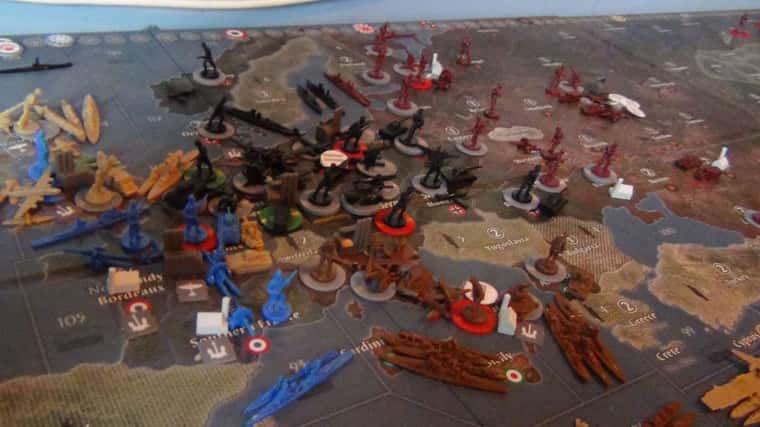
Germany, about to kill France and cause trouble in Europe.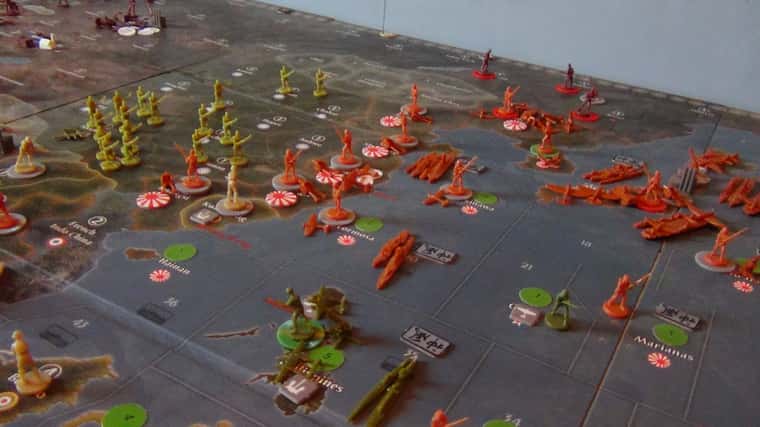
Japan, ready to strike in The Pacific Ocean and Asia
Here, I store my cut-out markers from the rulebook. I printed these on thick paper so that the markers are easy to pick up and last a long time. I store them on the edge of the board.
A full picture of my table. The unit boxes are stored underneath. -
Wouldn’t the 1943 house rules expansion take less time since it takes place later in history if you’re using the same house rules? Shouldn’t each round for both games on average take the same amount of time?
Anyhow, both games look daunting and complicated for someone who hasn’t played either yet.
-
That looks awesome:+1:
I’m impressed by the detail in the counters that you have cut out.
Great report:muscle:
-
This post is deleted! -
Global 1940 House Rule Expansion, a solo game by VictoryFirst
No. 1 Game Report
Round: Early 1940 (Round 1)
Germany:
Germany purchased five U-boats and upgraded six infantry and two artillery units to Waffen-SS troops. It then attacked various territories. All of mainland France was conquered, including Paris, with the capitulation of France as a result. Yugoslavia also fell. Numerous British naval ships in SZ 106 and 111 were sent to the bottom of the Atlantic. During NCM, Bulgaria and Finland joined the Axis. Three German aircraft landed in Rome for bolstering the defense of Italy, and the rest of the German Luftwaffe landed in Western Germany. AA guns moved west to guard the coastline. Other combat units moved east, in preparation for Operation Barbarossa.
Germany collected 84 IPCs (-1 lost to blockades)Soviet Union:
Soviets purchased one Elite, two infantry, six mines, two tanks, and one Commissar, and saved 7. Combat units moved west to form a defensive line. They concentrated their forces in Belarus and Western Ukraine.
In the Place Units Phase, the 1st Soviet Army Corps was formed, containing a Commissar and three Tank units. Soviet Union ended with 44 IPCs
Japan:
Japan produced three transports and one elite infantry, and saved 5. It started an offensive in China, and conquered several Chinese territories, including Yunnan. In the NCM phase, the Japanese air force was concentrated in Kwangsi. Most of the Japanese fleet moved to SZ 36, in preparation to surprise attack the Colonial Powers in Asia. Japan ended the turn with 53 IPCs.
United States:
The US built some naval units, including an Aircraft Carrier, and two fighters. It also demolished the Air and Naval bases in the Philippines, in case of an attack. Four fortifications were built in the Philippines as well. Numerous naval vessels moved during NCM, in particular in the Pacific. Most of the US air force moved to Wake Island. The US collected 52 IPCs.
China:
China successfully recaptured Yunnan from the Japanese.
United Kingdom:
The British purchased a fighter, some land units, and two air/naval base destructions. It executed the Taranto Raid; it attacked and destroyed parts of the Italian fleet with Naval and Air units. Interestingly, the Germans decided to scramble in one of the battles, to eliminate as many UK forces as possible. The UK also successfully attacked Ethiopia. Air forces landed in Malta, and land units moved into Egypt, some by rail. Sumatra joined the British Empire; an AAA and an infantry unit moved into its territory. Troops in India moved forward to Burma and Shan State. The naval bases in Malaya and Kwangtung were destroyed
The British collected 61 IPCs, ended with 59 (2 lost to blockades).
Italy:
Italy bought two Paratroopers. It attacked Tunis and British naval units that were left over from the attack of SZ 97. It ended with 16 IPCs.
ANZAC:
The Australians purchased a sub, moved into Java, and collected 21 IPCs.IPC Totals:
Without bonuses:- Axis: 84
- Allies: 163
With bonuses:
- Axis: 127
- Allies: 180
Some pictures of the situation at the end of Early 1940:
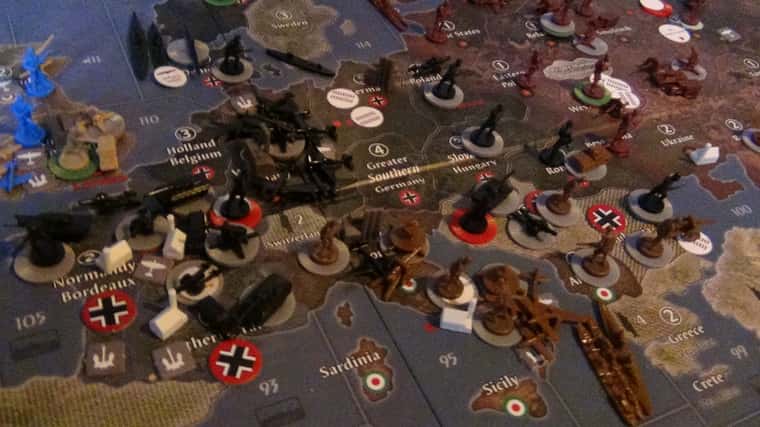
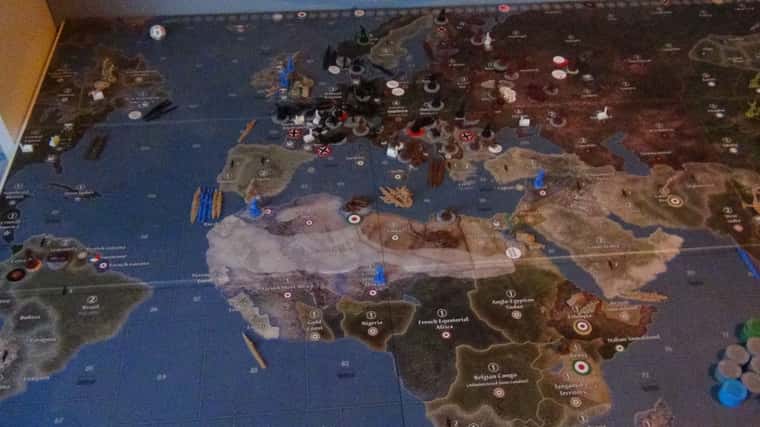
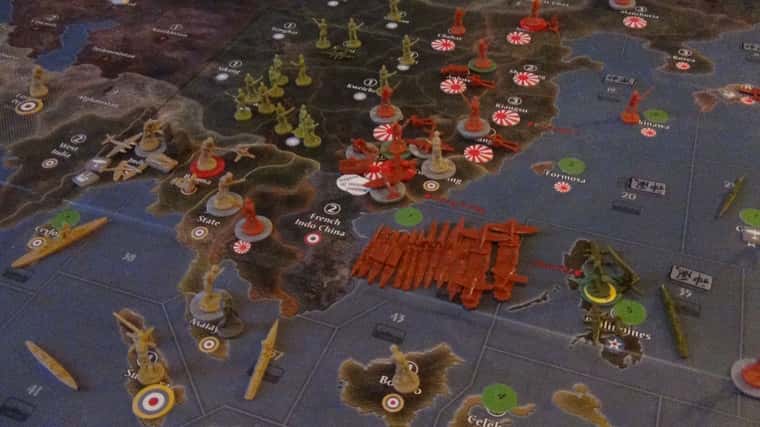

-
Nice report! Very detailed!
-
Global 1940 House Rule Expansion, a solo game by VictoryFirst
No. 1 Game Report
Round: Late 1940 (Round 2)
Germany:
Germany’s purchase:
5 U-boats
1 Panzer General
1 Elite
10 Infantry
4 Paratroopers
1 DestroyerNo combat took place during this turn.
Germans moved some more units East. The U-boats in the Atlantic scattered, and took positions in Convoy Sea Zones of the UK. A new air force moved to Rome, replacing the old one, which was eliminated during the Taranto Raid. 1st Panzer Army was formed in Berlin. Collected IPCs: 66.Soviet Union:
The Soviet Union continued to build up the defensive lines on the German Front. It purchased another six mines, a Commissar, and two Tank units, in preparation for forming the 2nd Soviet Army Corps in Moscow. The Soviets ended the turn with 53 IPCs.Japan:
Japan purchased two minor factories, as well as some naval units.
Japan made a Declaration of War on this turn against the Western Powers. It continued its advance in China and conquered several Chinese territories. Malaya and the Philippines were successfully attacked and conquered.
French Indo-China was forced to join the Japanese Empire.
During NCM, Japanese aircraft moved into Siam, Kwangsi, and Japan/SZ 6, to threaten as many territories and sea zones as possible.
Japan placed factories in Shantung and Kiangsu.United States:
The US purchased naval units. They attacked a U-boat Wolfpack in SZ 6 with two naval units and four air units. However, only two U-boats were killed, and both American naval units were destroyed.
In the Pacific, the Americans regrouped their navy and moved into offensive and defensive positions. One AC with two fighters moved south to SZ 54, to support ANZAC. The AC and two DDs were placed in SZ 10, and three DDS and a sub in sz 101. The US collected 81 IPCs.China:
China again successfully recaptured Yunnan.United Kingdom:
The UK purchased some air and land units and built four forts. Brazil and Persia joined the war on the Allied side, both on behalf of the UK. Sumatra was reinforced with infantry units and fortifications. One fort was also built in Borneo. A large force from Burma moved into Yunnan - to support the Chinese. The air units were placed in London, three tank units in South Africa, and infantry units in India.
The British collected 58 IPCs but ended with 48 due to blockades by the German submarines.Italy:
Italy built land units and paratroopers. It attacked Greece and Algeria. Syria was invaded by Paratroopers. The Italians also moved some units East, to help out the Germans in Operation Barbarossa.ANZAC:
built two subs and a destroyer. It attacked a couple of Japanese naval units. It also moved a fighter to Sumatra, to help with the defense.France:
Not a lot to report from France, except that they made one funny little move: they moved their African destroyer to the Pacific, to SZ 41 near Sumatra, in order to protect the UK transport :)Income totals:
With Bonuses:- Axis: 141
- Allies: 210
Without Bonuses:
- Axis: 103
- Allies: 154
Some pictures that depict the situation in Late 1940:
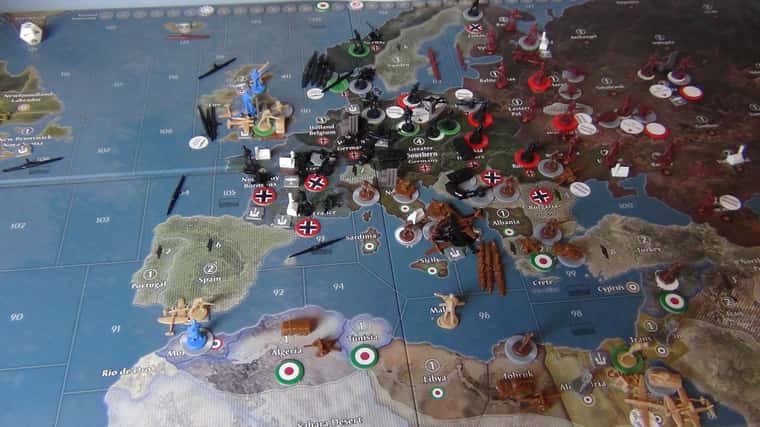
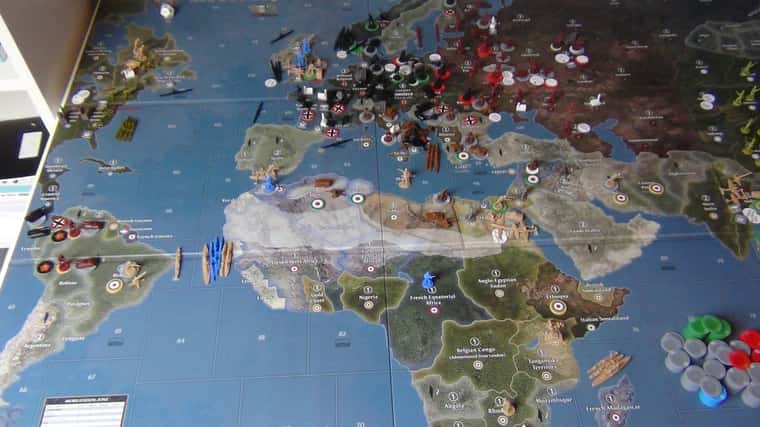


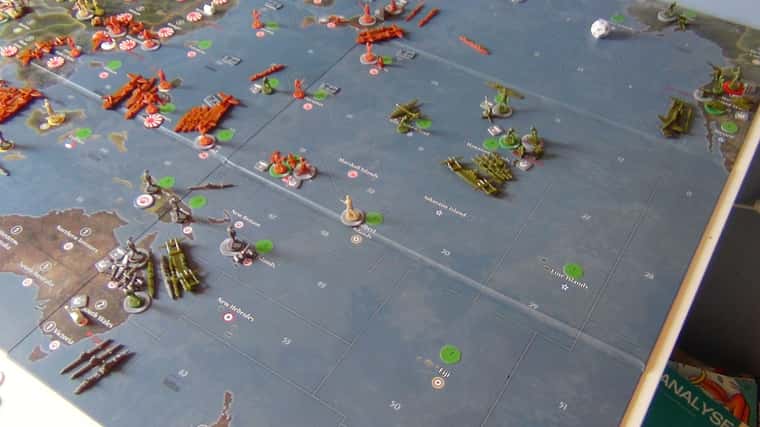
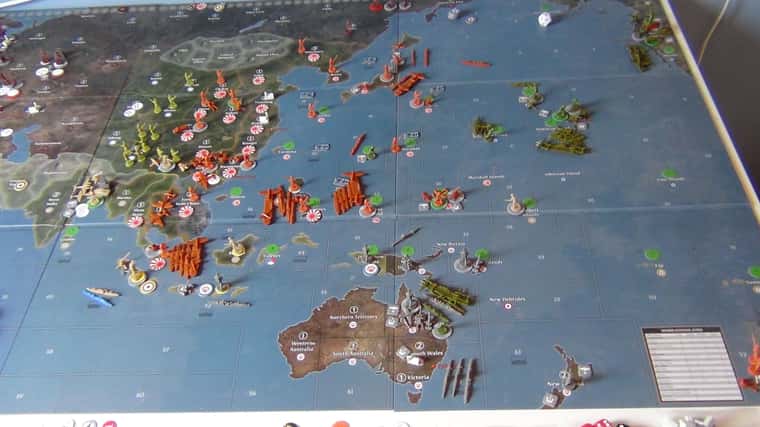
-
It is a good idea that you use the Strategic Rail Movement Markers - I was just gonna ask how the Italian Artillery unit got all the way to Bulgaria - until I noticed the Rail Marker:+1:
-
Nice. Looks exciting!
-
Global 1940 House Rule Expansion, a solo game by VictoryFirst.
No. 1 Game Report.
Round: Early 1941 (Round 3)
Note: Due to the length of the game report, I decided to take away some detail so that this game and other games become easier to follow.
Germany:
Germany bought some army leaders - to prepare for the formation of the 2nd Panzer Army, and the 1st and 2nd Waffen-SS Armies - as well as another five U-boats. The invasion of the USSR will be done next turn - in order to get as many units and armies as possible for the attack.
The German Kriegsmarine executed a bold and clever move - it moved all of its surface warships down to Gibraltar, as well as a Wolfpack of six submarines. Two infantry from Western Germany amphibiously invaded Gibraltar, along with two German Strategic Bombers. The Germans didn’t take the territory but did destroy two UK fighters and one infantry that were stationed there in combat.
Most of the German Luftwaffe landed in Algeria - to meet any Allied naval ships that are bold enough to attack the German Kriegsmarine with a massive counter-attack.
Soviet Union:
Russia purchased land units, as well as another six mines. The 3rd Soviet Army Corps was created in Moscow.
Japan:
Japan repaired its damaged battleship, rebuilt the naval base in the Philippines, and purchased six tanks for the factories in mainland Asia. It then made a massive offensive against numerous territories, with few ground units and a lot of air and naval support: Yunnan, Sumatra, Borneo, Celebes, Java, and Guam were attacked. Almost all attacks were successful, however in Sumatra and Borneo, all land units were destroyed, so these territories weren’t captured.
The Japanese suffered heavy losses during this offensive, especially the Japanese air force - due to AAA guns that were defending in various territories.
United States:
The Americans produced a large carrier fleet in The Atlantic, seeing the danger of the massive German U-boat fleet. Three fully loaded carriers and a total of six destroyers are now operating in The Atlantic - and much more will come.
In The Pacific, the US purchased two destroyers to support its navy - and prepared the lend-lease of three tank units to the Soviet Union. The delivery will be in the Soviet Far East, and is expected in Early 1942
China:
The Chinese were forced to retreat, due to a large Japanese force in Kweichow. They retook Yunnan again and took defensive positions in the mountains.
United Kingdom:
The UK built three fighters in London - in order to rebuild their combat losses in Gibraltar - as well as a Minor IC in Egypt, and combat units in India. It moved its air force from London to French West Africa - to replace the aircraft that will be lent-leased to the USSR. It lost 7 IPCs due to blockades (remarkably, the Japanese navies in the sea zones around Borneo and Sumatra failed to take away a single IPC).
Italy:
Italy captured the empty Gibraltar, and reinforced the territory of Algeria with land units, to take out Morocco next turn.Income totals:
With Bonus:- Axis: 155
- Allies: 207
Without Bonus:
- Axis: 112
- Allies 151
Some pictures that depict the situation in Early 1941:


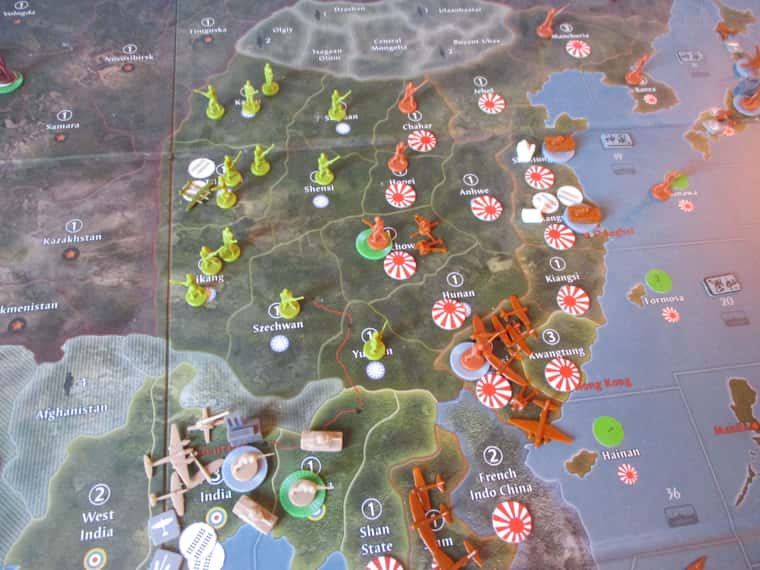

-
Awesome and exciting! I hope the Axis win.
-
Global 1940 House Rule Expansion, a solo game by VictoryFirst.
No. 1 Game Report.
Round: Late 1941 (Round 4)
Germany:
In this turn, Germany started Operation Barbarossa and invaded the Soviet Union. The Soviets got an immediate 10 IPCs bonus, and purchased two tank units - these were placed in Bryansk. The Caucasus was invaded by a paratrooper assault and Karelia was attacked by an infantry army from Finland. AGN and AGS were formed in the Baltic States and Bessarabia respectively. The Germans also reinforced their navy in SZ 91 with more U-boats. This turned out to be a tactical mistake…
Soviet Union:
The Soviets dug in their land mines - in order to slow down the Germana advance. They also purchased six Guards infantry units, as well as seven more mines. The air and naval base in Novgorod were destroyed in advance.
Japan:
Having a lack of destroyers in the South Pacific, the Japanese produced three more, as well as land units for Asia. The empty Borneo and Sumatra were scooped up. At this point, the Japanese have a large income - they collected over 70 IPCs.
United States:
The US reinforced the Atlantic Navy with a BB and several destroyers. SZ 91 was attacked by five Fighters, one Tactical, six Destroyers, and a Submarine. There were heavy losses on both sides. This attack was part of a two-staged attack, one by the US, and one by the UK, which would attack the remaining German boats further with a large attacking force. The Americans retreat their aircraft after all screens had been destroyed, and landed on carriers in SZ 87.
Three tank units were lent-leased to the USSR.United Kingdom:
The British built another three fighters, as well as some naval units for the factory in Egypt. SZ 91 was attacked with some naval units - and a massive airforce. The remnants of the German Kriegsmarine were destroyed - with negligible casualties for the British.
Most of the German U-boats have now been destroyed. A major defeat for the Axis in the Battle for the Atlantic.
Two Fighters and a Tactical Bomber were lent-leased to the USSR.
Italy:
Italy helped Germany on the Eastern Front by attacking Eastern Poland. Italy will be supporting Germany here as much as possible.
A large Italian paratrooper force, together with some landing crafts and land units, are now stationed in Greece - in order to threaten Soviet coastal areas, like Caucasus and Rostov.
ANZAC:
ANZAC built a transport and more submarines. Two Japanese transports were destroyed.Income Totals:
With Bonus:- Axis: 166
- Allies: 186
Without Bonus:
- Axis: 123
- Allies: 141
Some pictures that depict the situation in Late 1941:
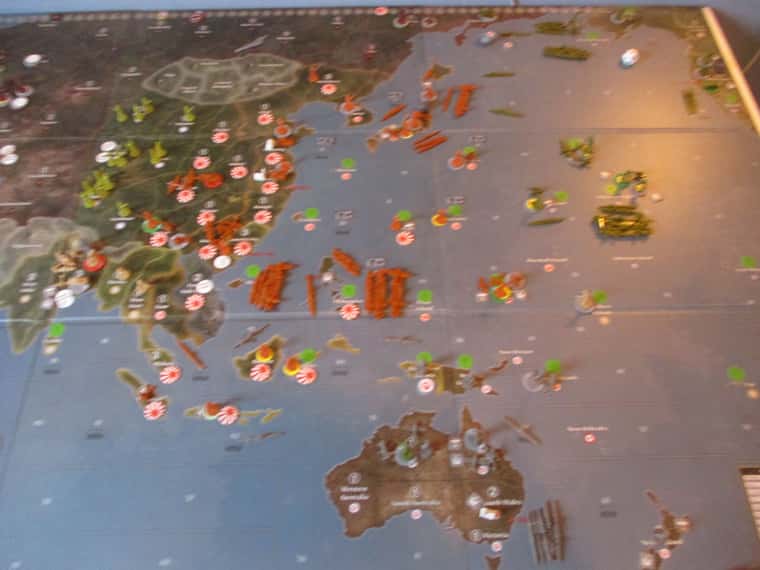

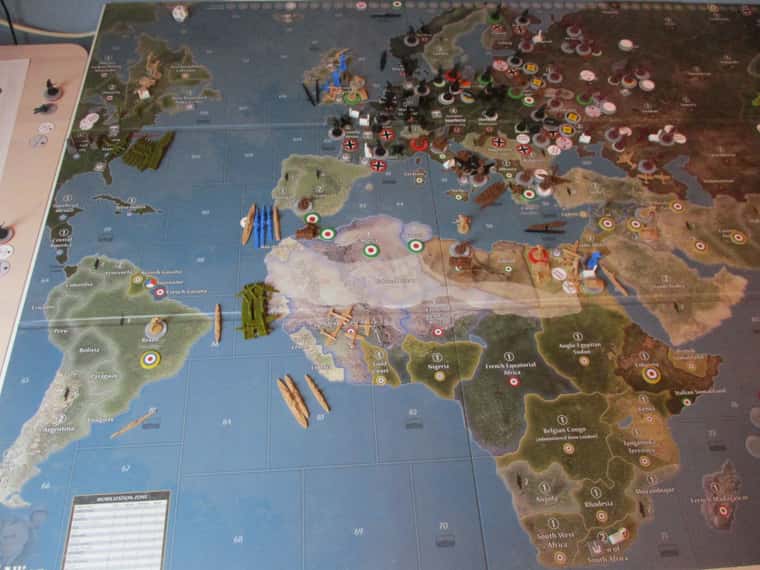
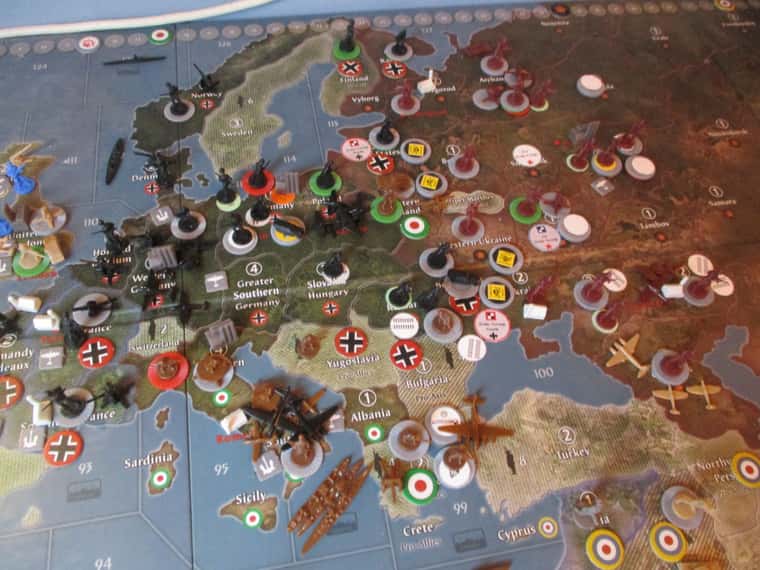

I have rearranged my room and thrown away some old junk so that I could make some space for an extra table beside the board, where I can store the Timetable and Army Boards. Formerly, I was using South America to place the units inside the Armies, as you might have noticed :) -
Nice. Worried about the Axis though.
-
Global 1940 House Rule Expansion, a solo game by VictoryFirst.
No. 1 Game Report.
Round: Early 1942 & Late 1942 (Round 5 & 6)
Germany:
Germans took Novgorod, but they couldn’t move into Ukraine, because of a massive Soviet force that could counter-attack. So they moved a lot of units to positions where they could reach Ukraine instead and tried to move their AGS to the territory in Late 1942. If the Soviets decided to counter-attack, at least they would be met by a counter-counter-attack :)
Soviet Union:
The Soviets got their Soviet Conscription done and recruited 26 infantry for the defense of the motherland. They moved some more mines forward, and also made an interesting move - they dug in three land mines on the border with Rostov and the Black Sea, in order to deter any Italian naval landing forces with landing craft, that were stationed in Greece.
In Late 1942, massive carnage on the Eastern Front occurred. The Soviets did attack Ukraine, with a massive trade as a result. The Germans lost everything, including their full AGS. The Soviets lost everything except their air force. The Stalingrad factory moved east. Except for the 3rd SAC in Belarus, which will likely get destroyed on the next turn, the Soviets have no armies at the moment.
Japan:
Japan has a huge income, but yet they struggle to defeat all of their enemies. China is getting closer to defeat, but the British forces in India advanced to Burma. The Australian submarine fleet is becoming a nuisance in the South Pacific, and many Japanese convoys get sunk by this. Japan needs some well-coordinated maneuvres in order to get a grip on the situation.
United States:
The US are building a large transport fleet - both to threaten Italy and the Mediterranean Coast, as well as to prepare for D-Day in the future. The US have already landed in Morocco.
The Germans, seeing this, have begun the construction of the Atlantik Wall. Mines and infantry are on their way to France.
United Kingdom:
Britain, like the US, is also preparing for an invasion of Europe. The Italian forces in Africa are being pushed back. A large navy with a carrier and naval transports is being formed in the Atlantic. The British also rebuilt the naval base in Gibraltar, which was destroyed by the Italians on an earlier turn.
In India, land units are produced at full speed, in order to make life for Japan as hard as possible, Not allowing them any time to recover.
Italy:
Italy is also building up its defenses. The goal is for Italy to survive until Late 1943 - so that the German Take Over of Italy can take place. Italy is still assisting Germany on the Eastern Front - but its forces grow smaller and smaller due to a lack of reinforcements.
ANZAC
The submarine spam strat seems to be working, but now the Australians need to pay attention to their defenses. Japan has arrived with two massive fleets, that will likely clean up the submarines. A naval transport fleet is also on its way, and the Australian homeland might be threatened.Income Totals for Late 1942:
W/Bonus- Axis: 165
- Allies: 182
Wo/Bonus
- Axis: 127
- Allies: 137
Some pictures that depict the situation in Late 1942:
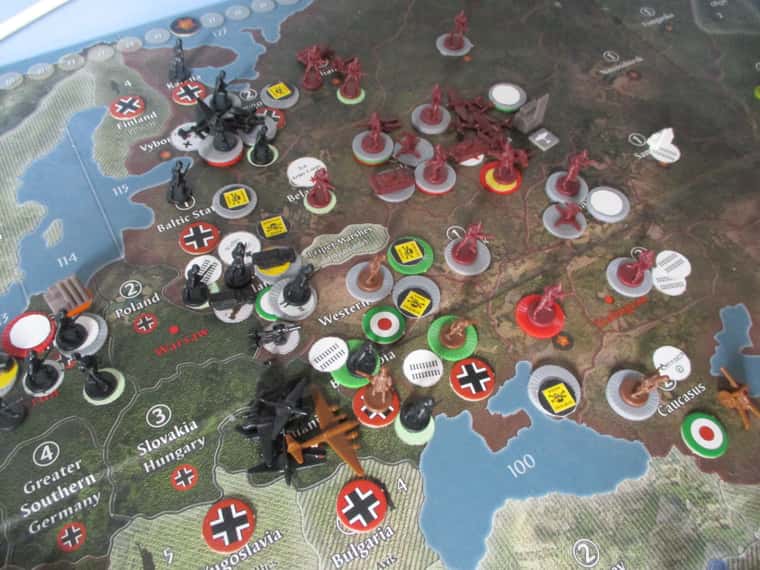
Eastern Front heating up. Although the Germans have a much higher economy, the trade might have favored the Russians, since the front is close to their supply lines. However, German reinforcements will be on their way!
The Soviets have a large infantry force in Smolenk, to be able to counter-attack several territories.
In any case, The Captain and his group did a very good of making the eastern front interesting :)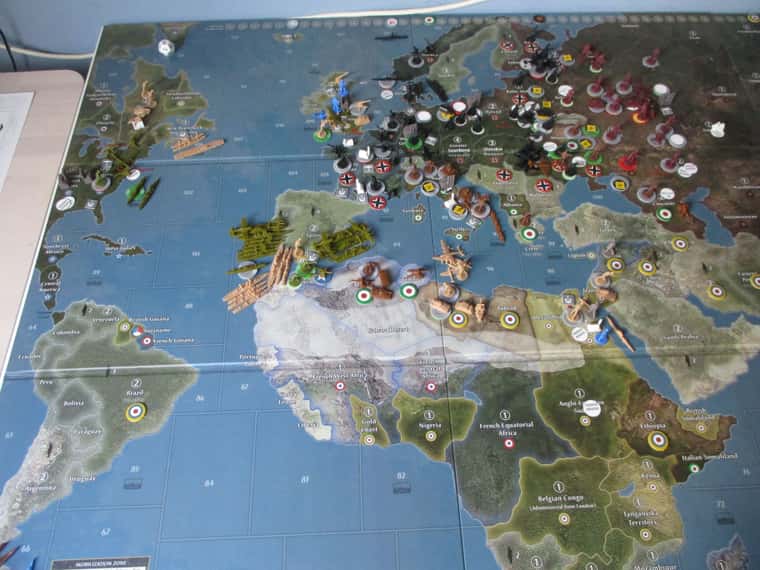
Allied fleets knocking on the door.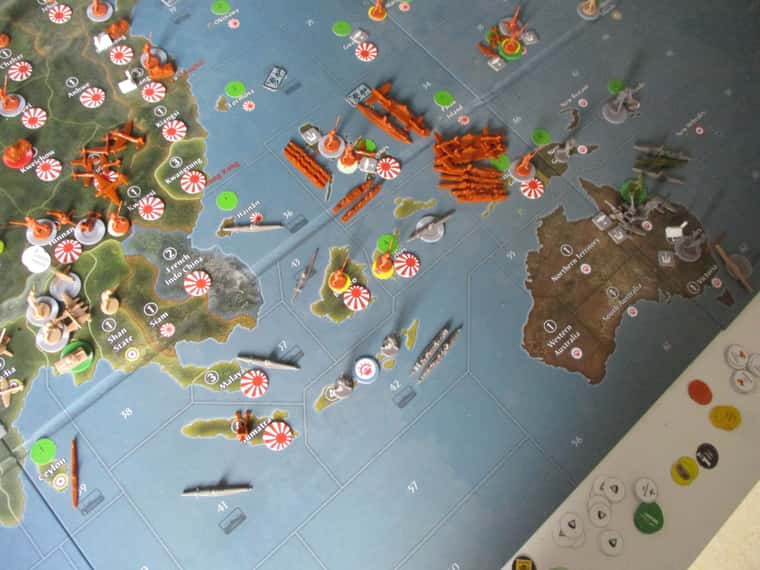
ANZAC submarine fleet wreaking havoc. Java was also liberated, although not for long, seeing the Japanese reinforcements coming.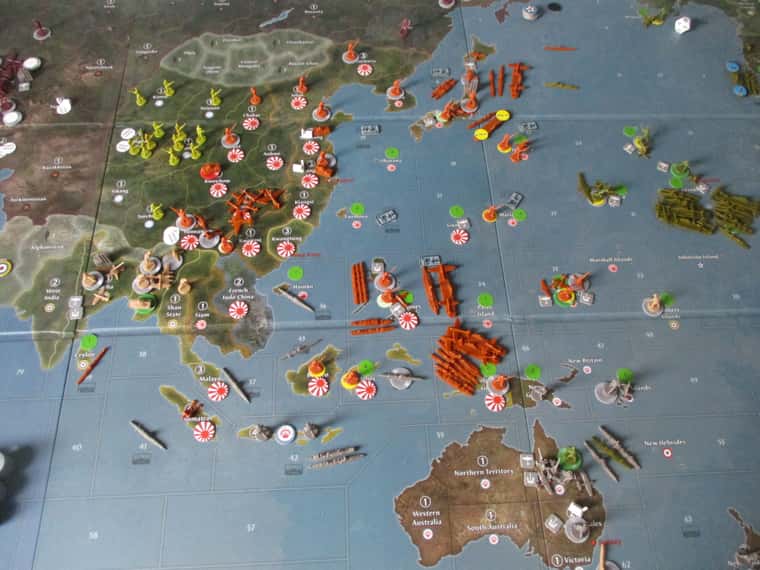
Japanese struggling to maintain their large empire. -
Very cool! Hope it all works out for Japan.
-
New Report for Victory’s and my Game.
https://www.axisandallies.org/forums/topic/37723/global-1940-1943-expansions-game-reports/428?page=18 -
B barnee referenced this topic on
-
Nice.
-
I really like the story you have going on here. Hope the Axis win.






